Rippling, a rapidly expanding startup that found itself in a legal dispute when one of its employees allegedly released sensitive information to a competitor.
Pavel Shynkarenko, a tech entrepreneur, commented on the lawsuit and said, "If the scandal continues to escalate, both parties could face reputational and financial losses. Customer acquisition costs will rise, and closing new contracts will become a longer and more complex process."
Any lawsuit (even if it is a necessary evil) burdens the company. It reiterates the need for strong contracts to prevent disputes and effective contract management practices to catch potential risks early on. In this post, we will look at the legal challenges developing companies face and how using AI in the contract management process can tackle them.
8 Common legal challenges in fast-growing companies
As a company grows, it's natural for the amount of paperwork they do regularly to increase. That's when these lapses can happen:
1. Poor worker documentation
An emerging company can hire different types of workers: consultants, temporary, contractors, part-time, etc, to fulfill business requirements. Now hiring each type of worker comes with its own compliance requirements. Missing those could lead to misclassification risks.
Further, if you are expanding to different locations, each country has its own labor laws that must be taken care of in the documents. Overall, too many variables get added to the mix, making the potential for lapses in worker documentation.
“Many businesses assume a one-size-fits-all approach to drafting employment contracts. They fail to customize each agreement for specific job roles or industries. This may lead to missing contract clauses that define confidentiality, dispute resolution, or intellectual property rights. Thus, an employment contract should be tailored to reflect the nature of work, industry regulations, and company policies. A well-drafted employment contract serves as a guide to create long-term workplace stability and success. Leaders prioritizing contract clarity improve organizational compliance and drive stronger employer engagement and business growth.”
~ SHRM Advisor
Common Misconceptions About Employment Contracts
2. Incomplete IP documentation
In rapidly changing companies that are managing multiple vendors and workers, the focus on expansion can sometimes overshadow the crucial task of establishing thorough intellectual property (IP) rights. It becomes easy to cut corners on documentation and fasten project work. Poor documentation could eventually lead to licensing, trademarking, and copyright issues.
“Intellectual property issues are a common challenge faced by entrepreneurs, and effectively navigating these challenges is essential for the long-term success and growth of a startup. By understanding the complexities of IP protection, avoiding infringement, and proactively managing IP assets, entrepreneurs can safeguard their valuable innovations and creations and maintain their competitive edge in the marketplace.”
~ Mike Patterson, Business consultant
Intellectual Property Challenges Commonly Faced by Entrepreneurs
3. Increased data security gaps
Business growth also brings in the following complexities in data handling:
- Every new vendor you add has to be compliant with industry regulations. For instance, companies dealing with patient data must sign HIPAA BAA agreements with vendors.
- Every new employee you onboard must stay compliant with the company's data confidentiality and security practices. Employees must sign confidentiality agreements and be aware of the potential consequences of breaching them.
- Every customer's data must be stored in a compliant way as per the standards set by the local jurisdiction. For instance, GDPR applies to customers in the European Union, and CCPA applies to California residents.
All these expectations are set in paperwork and it takes time for companies to create solid agreements that leave no room for lapses.
“Data privacy was once a consideration, but perhaps not the central, high-stakes issue it is today. However, the landscape has fundamentally shifted. Data privacy has surged from a background concern to a core business imperative, profoundly altering the dynamics of technology agreements.”
~ Irina Beschieriu, Tech & Commercial Contracts Attorney
Uncapping risk: The growing burden of data privacy liability in tech contracts
4. Inadequate regulatory compliance
Expanding into every new region, sector, or industry comes with increased compliance expectations. For instance, imagine you have a SAAS product that was used by biotech businesses so far, and now you are expanding to healthcare. This expansion means navigating a new set of regulations and establishing agreements that adhere to those healthcare industry standards.
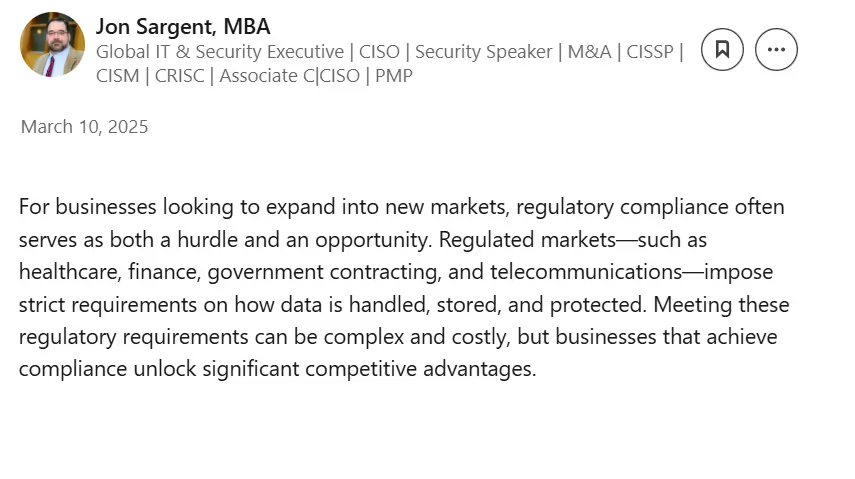
Importance of regulatory compliance | Jon Sargent via Linkedin
5. Slow document approval process
With a massive influx of documents, old ways of manual approval via email become clumsy. It becomes essential for organizations to look for an automated solution that tracks document approval, routes requests to the right stakeholders, and sends reminders.
“Manual contract processes slow teams down - lost documents, approval bottlenecks, and compliance risks add up fast.”
~ Gal Bruck
Fractional In-House & Legal Ops Specialist
6. Disorganized document storage
It becomes essential for fast-growing companies to find a centralized and optimized storage space for documents so employees don't waste their valuable time searching for misplaced documents.
“Many companies do not realize the importance of records management and risk management until they get into trouble. Being preemptive and proactive can alleviate loss of important documents and mitigate risk.”
~ Anita Castle
Information and Records Manager
7. Incorrect documents
In-house legal counsel are already juggling too many responsibilities that increase further with the organization's growth. Small mistakes start slipping through cracks, and proofreading errors become more common.
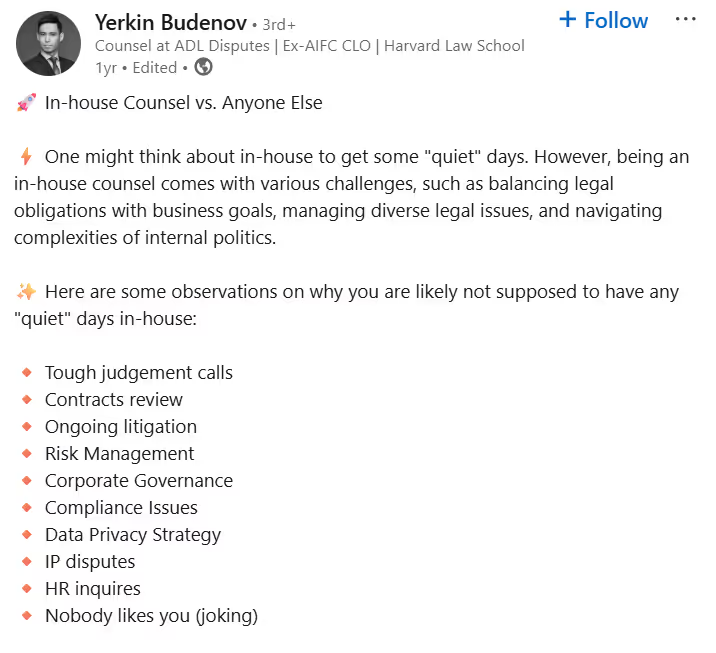
Task list of in-house counsel | Yerkin Budenov via LinkedIn
8. Missing dispute resolution strategy
As companies scale, they encounter more complex and frequent disputes internally (among employees, departments) and externally (with customers, suppliers, partners, regulators). Without a well-defined plan for addressing these conflicts, growing organizations can face a cascade of negative consequences.
“Pursuing and responding to contract disputes is often a costly and complex process. Avoiding such disputes – or having processes in place to resolve disputes quickly when they arise – can reduce the risk to your organization of incurring substantial expenses or bad publicity.”
~ Randy Brunet, K.C., Matt Barnes, Matthew Douglas
Technology contracting: Proactive strategies to avoid costly disputes
What is AI in contract management and how can it solve legal challenges?
AI is the solution that fast-growing companies need to meet all their legal challenges. AI can completely turn around contract creation and management to address major legal challenges. Shashank Bijapur, CEO of SpotDraft, has been actively speaking about how embracing AI will help legal teams to do their tasks faster and better.
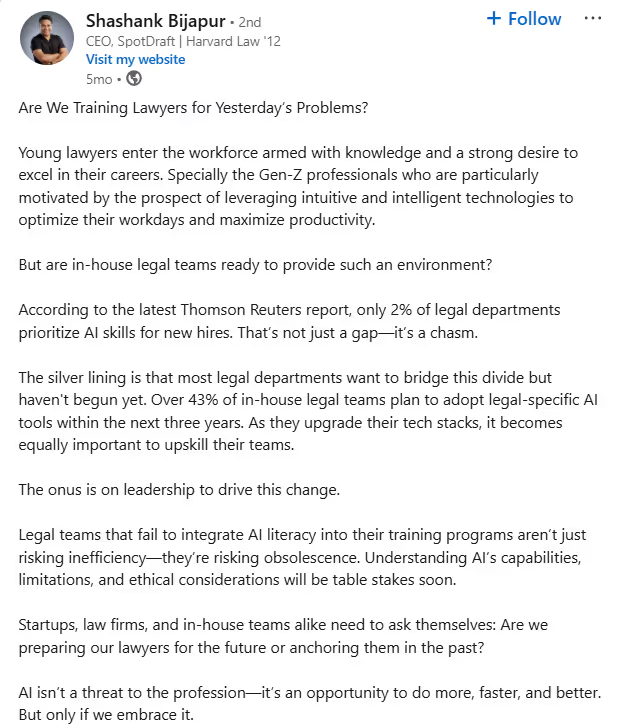
Benefits of AI in legal | Source: Shashank Bijapur via LinkedIn
Here are the top ways how AI can improve contract management and overall legal processes of companies:
1. Intelligent contract creation
By using AI-powered contract lifecycle management (CLM) solutions, companies can:
- Create templates: Contract management software with AI capabilities can take past agreements as a reference and create standardized templates using them. The next time you create a contract for the same use case, all you have to do is enter a few details in the template, and the contract will be ready. For example, you can have four different templates for hiring:
- Employees in France
- Contractors in France
- Employees in Mexico
- Contractors in Mexico.
All templates will be compliant as per local laws. For every new hire, the HR team can create contracts using the existing templates to improve compliance.
- Fasten creation: An AI-powered contract management system analyzes contracts and can auto-suggest specific clauses to speed up the creation. For example, if you are creating a new hire agreement and missed adding IP rights, confidentiality clauses, or dispute resolution methods in it, AI can provide automated suggestions during contract drafting.
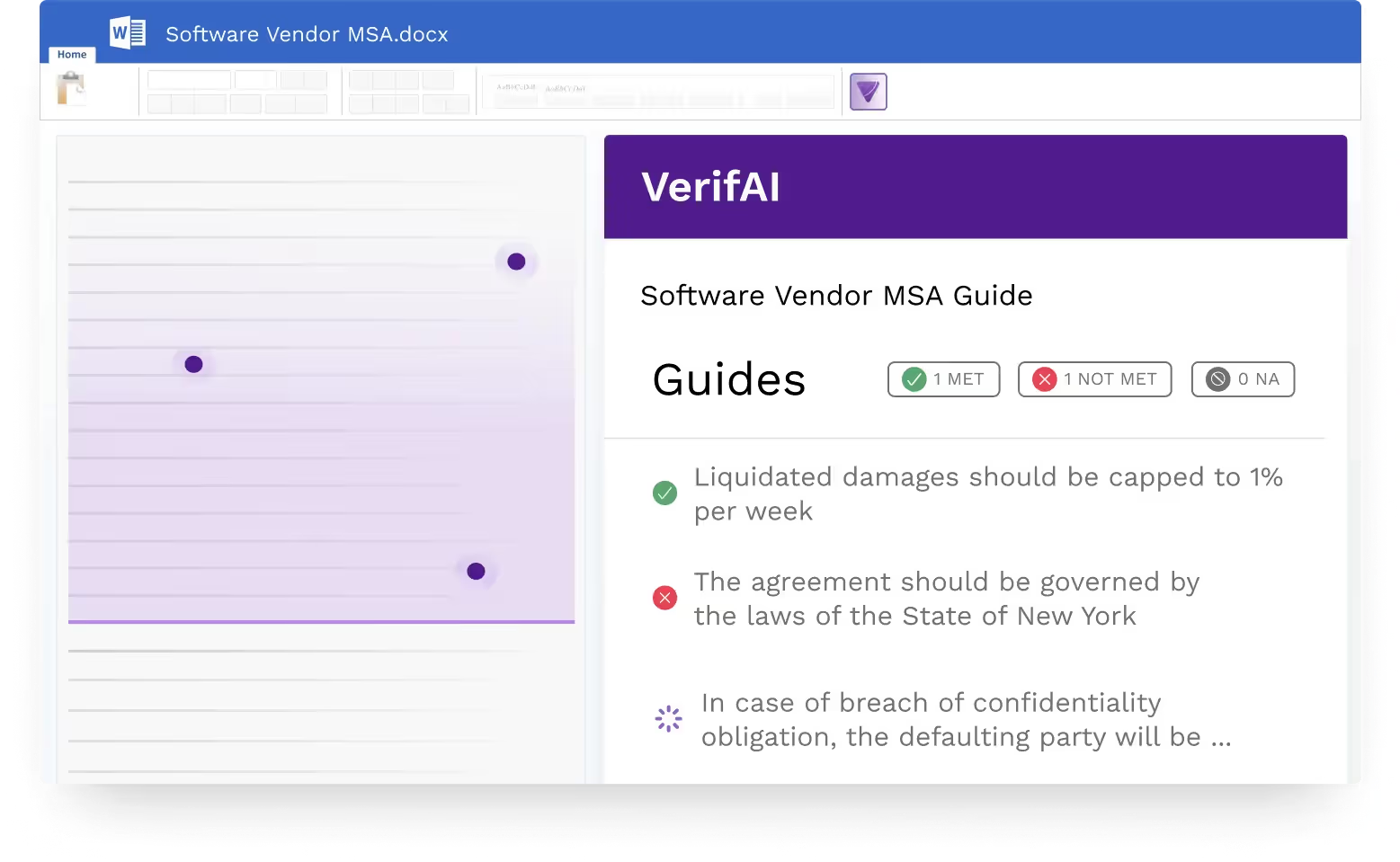
SpotDraft AI making suggestions during contract drafting and review
2. Automated approval workflow
AI-driven contract management systems are also smart enough to route contracts to the right stakeholders for thorough review. For example, you have a big licensing agreement with expected payment larger than a particular amount. AI will route it to the finance department for review to verify royalty rates, licensing fees, payment schedules, and reporting requirements.
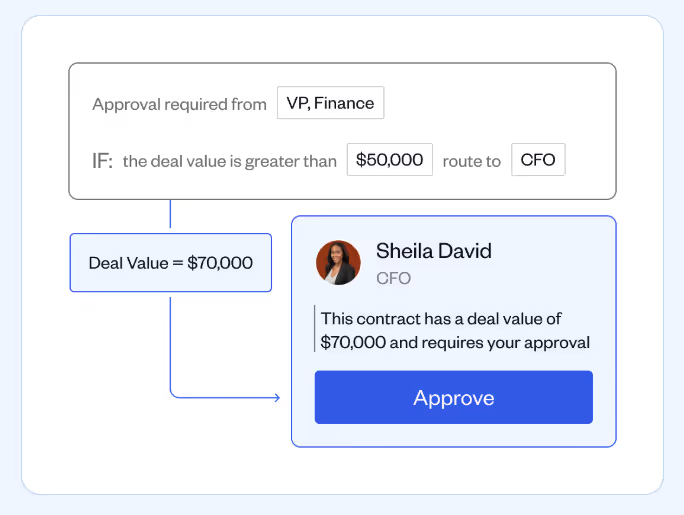
AI routes contracts to respective team for review
3. Smart contract reviews
An experienced counsel says reading a contract and expecting to understand it on the first go is wishful thinking. A thorough review requires legal counsel to spend multiple times re-reading the contracts, but unfortunately, they always remain crunched for time. That's where AI helps. AI-powered contract management system can assist legal teams in their reviews and prevent any human error by:
- Generating contract summaries: AI can generate a shortened and effective summary that helps in getting the gist of the contract quickly.
- Redlining terms: AI models learn from past data and, based on it, can recommend which term is right or wrong in the contract. For example, if you have written a contract for a client in California and mentioned Delaware as the governing law, AI can quickly flag it.
- Suggest terms: AI models can also suggest terms you have missed by mistake. For instance, if you missed the confidentiality clause in the contractor agreements, AI provides relevant suggestions.
- Pull key terms: AI models also assist in reviews by picking specific terms that need extra attention. This feature particularly helps reviewers to double-check terms that are absolutely necessary for those agreements. For instance, if the legal team is reviewing a licensing agreement, they can pull key terms such as scope of rights, sublicensing rights, exclusivity, etc, for verification.

AI review of contracts
4. Advanced contract lifecycle forecasting
AI-powered contract management solutions tools also provide a contract analytics dashboard with valuable insights to improve legal workflows. For example, these dashboards provide real-time insights based on past contract data, such as turnaround times for different types of contracts by different teams. You can use this data to improve the contracting process, identify bottlenecks/delays, and create strategies to prevent those delays.
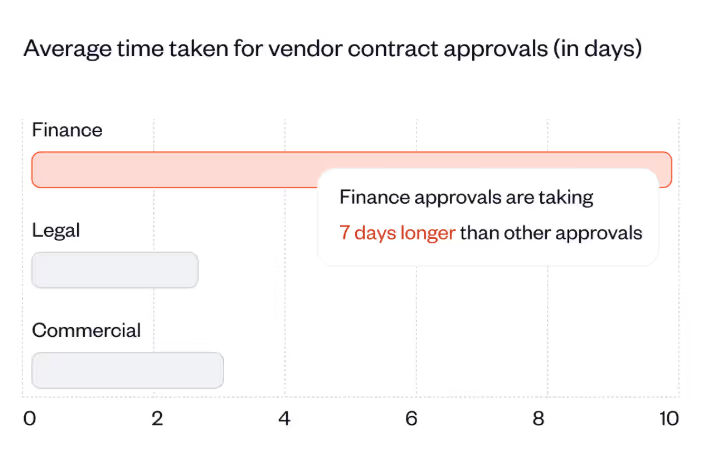
Contract analytics dashboard
“Artificial Intelligence just may well be the final frontier in terms of how legal services are utilized and provided. As in-house counsel, don’t run away from it and don’t ignore it. Rather, embrace it as, ultimately, it will allow you to do things lawyers love to do: thinking, analyzing, and counseling, while leaving the “grunt” work to the computer.”
~Sterling Miller, CEO and Senior Counsel for Hilgers Graben PLLC
Ten Things: Artificial Intelligence—What Every Legal Department Really Needs to Know
How are growing businesses using AI in contract management?
The simplest way businesses are taking advantage of AI to improve their legal workflows is by using AI-powered contract lifecycle management solutions. Here are some of the best examples:
1. Entertainment Benefits group enables self-service contracts
Entertainment Benefits Group is one of the largest travel and entertainment providers in the United States. Their legal team was stretched too thin with too many document requests. That's when they shifted to SpotDraft, an AI contract management solution to speed up contract creation. They centralized all contract templates in SpotDraft, enabling different teams to create contracts themselves without even involving legal for every basic task.
2. Buoy Health improved contract tracking processes
Bouy Health, a health technology company, used to manage contracts in a humble Excel sheet. While that was easy during the early stages of the company, it soon turned messy and unscalable with growing volume and business demands. That's when they started using SpotDraft to bring an automated system for contract approvals and tracking.
3. Open reduced contract errors by 65%
Open, Asia’s pioneering neo-banking platform for SMEs and startups, had a small legal team that used to 1000+ contracts to create and manage annually. Manual reviews were becoming tedious and also error-prone. So they turned to AI to improve contract workflows. Using SpotDraft, they were able to reduce errors in contracts by 65% and reduce manual effort.
4. Gameskraft increased contracting efficiency by 75%
Gameskraft, an online skill-based games company, was dealing with at least 30 contracts at any point in time. Their legal team was tracking all contract creation, review, and approval manually. The approach soon started to prove ineffective, and they reached out to SpotDraft to systemize the process. SpotDraft's AI feature helped them improve the contract review process, increasing contracting efficiency by 75%.
“My favorite feature of SpotDraft is the AI that updates contract metadata. It saves me so much time daily as a legal professional by capturing essential contract information after it's signed and executed.”
~ Meghna De,
Associate Counsel, Gameskraft
Scale your business efficiently with SpotDraft
SpotDraft is an AI-powered contract lifecycle management that helps fast-growing companies solve all gaps in their legal workflows. It improves creation and management of legal documents at every stage:
- Contract creation: SpotDraft AI can take any contract and automatically create a template from it. You can expedite contract creation by using these templates. Further, SpotDraft AI helps maintain consistent and complete contracts by suggesting relevant clauses and language during drafting.
- Contract review: SpotDraft AI routes contracts to relevant stakeholders for review. Stakeholders can generate quick AI-powered summaries and pull key information to conduct reviews faster. It also redlines risky terms and suggests alternatives.
- Termination/Renewal: SpotDraft AI pulls key information such as party names and dates from contracts. You can easily set reminders for the termination/renewal of contracts for any follow-up activity.
Book a quick demo to optimize your legal workflows.


.avif)



.avif)


